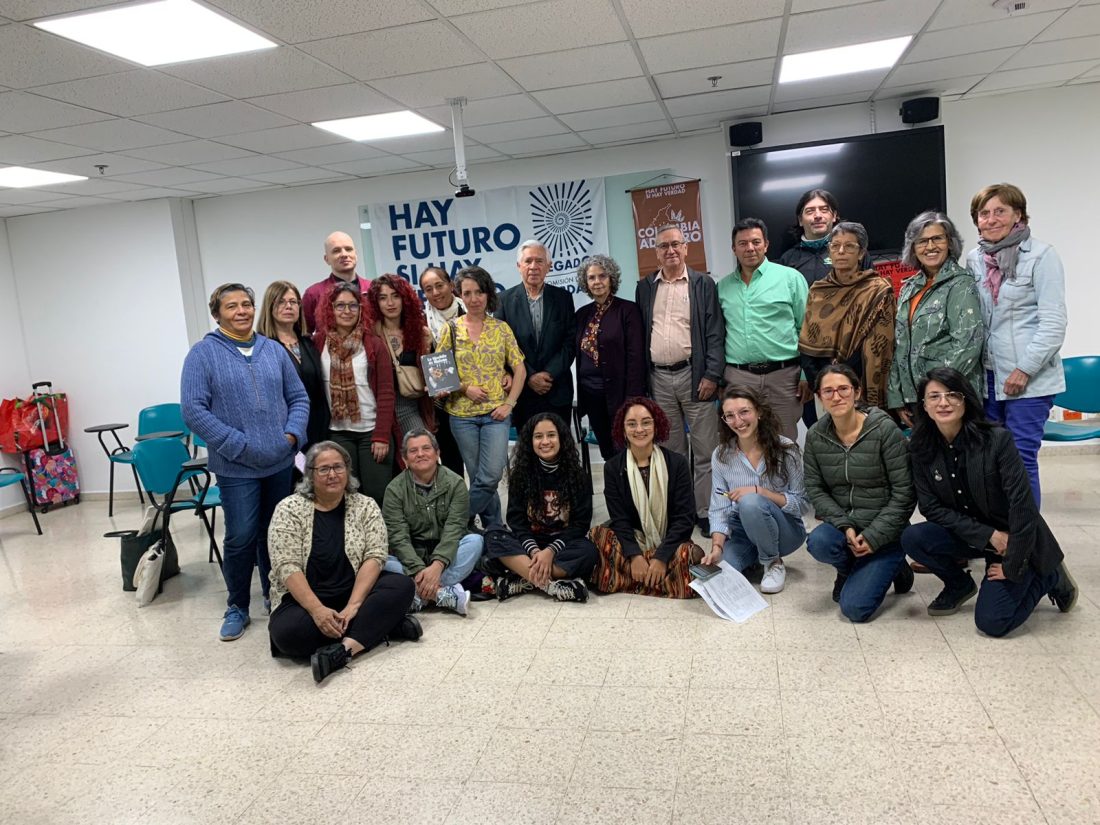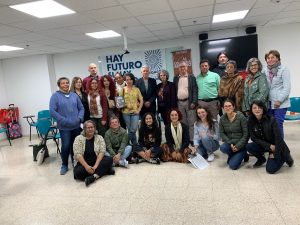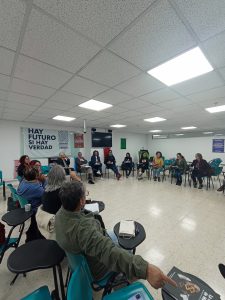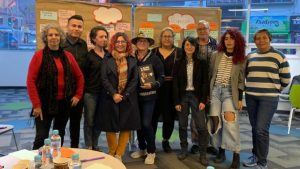
Alfredo Molano Bravo Chair coordinating committee meeting and training workshop for trainers

The Report of the Truth Commission was published approximately a year ago, and since then, Colombian society has made numerous efforts to embrace its legacy. CAPAZ, in collaboration with the Alfredo Molano Bravo Foundation, is no exception. That’s why, since 2022, they have been working together as members of the Coordinating Committee of the Alfredo Molano Bravo Chair (CAMB). CAMB is an anti-chair that emerged from an initiative by former Commissioner Saul Franco prior to the completion of the Truth Commission’s mandate. It aims to promote the socialisation, dissemination, and appropriation of the Commission’s Legacy and Report, as well as the Legacy of Alfredo Molano Bravo, who served as a commissioner until his final days.
This project has also involved the collaboration of the Truth Commission’s Collaborative Team, the University of Tolima – ASCUN, the Coordination of the Governance and Peace Table – SUE, UNIMINUTO – ASCUN, ANZORC, ONIC, PCN, along with CAPAZ.
The Coordinating Committee of the Chair held its first in-person meeting in Bogotá on April 26th, 27th, and 28th. The meeting was attended by leaders from indigenous, peasant, peace signatory organisations, as well as representatives from public and private universities. In addition to planning for the current year, a training workshop for trainers was conducted to strengthen this anti-chair project.
On April 26th, the coordinating committee held a private meeting at the Areandina University headquarters in Bogotá. During this meeting, the committee conducted an assessment of the Alfredo Molano Chair’s activities in 2022. The objective was to identify strengths, weaknesses, strategies, and areas for improvement for the year 2023. The past year was undoubtedly enriching for the CAMB, as it included the organisation of five summer and winter schools. These schools provided a platform for engagement with indigenous communities, individuals affected by conflict, children, women, Afro-Colombians, and others, fostering discussions on the legacy of the Truth Commission and Molano, while addressing current sentiments and struggles. Additionally, each member of the coordinating committee carried out targeted activities in their respective territories, focusing on memory-building, peace, and community development.

On the morning of April 27th, the coordinating committee engaged in a reflective session that resulted in the creation of a map outlining dreams and projections for the next five years. The committee highlighted the importance of having a more impactful presence in three key areas: pedagogy, publication/dissemination, and politics. In the short term, preparations for the first Training of Trainers School took shape through collaboration with the National Coordinator of Women from the Peasant Reserve Zones in Villavicencio, scheduled for June. This initiative aims to empower participants and provide them with the necessary skills and knowledge to become effective trainers in their communities.
After outlining the future of CAMB, the first Trainer Training Workshop commenced in the afternoon of the 27th. This space went beyond traditional approaches and successfully aimed to connect with all members who, from their territorial and institutional spaces, can contribute to the dissemination and appropriation of the peace legacy. The workshop began with a focus on self-recognition, where participants used cherished objects to connect with their origins, identity, and those of their colleagues. This was followed by the reading of texts by Alfredo Molano, accompanied by meditation. The environment fostered a deep immersion in active listening to others and to oneself. By the end of the workshop, participants experienced a crucial aspect of the “Molano method”, which involves storytelling and peacebuilding through active listening, consciousness, understanding, and recognising the other. Collective work is not possible without first respecting our colleagues, and these values serve as the foundation for the forthcoming implementation of the anti-chair.
On April 28th, the final day of the event, the attendees, accompanied by former commissioners Saúl Franco and Ricardo Villamarin, engaged in a formal exploration of the Report of the Truth Commission (CEV), delving into each volume of the report. This exercise was characterised by its distinctive feature: horizontal communication. The ex-commissioners shared anecdotes from the investigative process conducted by the CEV, as well as the comments and emotions of those present on that day.
This gathering proved to be highly beneficial, showcasing the efforts made by civil society to embrace the legacy of the Truth Commission and the work of Alfredo Molano Bravo, who served as a commissioner during his final years of life.



